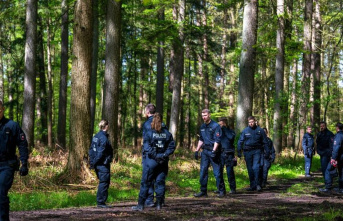Børge Brende has been President of the World Economic Forum since 2017. Previously, he was Norway's Foreign Minister and Minister for Economic Affairs.
Mr. Brende, the IMF has forecast a "very painful" outlook for the global economy and warns that the "darkest hours" are yet to come. Do you agree?
We are very likely facing a global recession. The last major economy to enter recession is likely to be the United States. We have a challenge: the post-pandemic recovery has been disrupted – and even that recovery wasn't easy. It has cost countries around the world $15 trillion to stimulate the economy to avoid a depression. The bailout packages have slackened fiscal muscle in many countries to combat the coming recession. And with inflation at a record high, stimulating the economy and supporting demand isn't easy either.
In May you said: "We're worse than last year, but better than next year" - are you still sticking to that sentence?
Yes - next year will be more difficult for the global economy than 2022.
Many fear stagflation. How likely do you think the scenario is?
Stagnation is possible if we don't take the right actions. High inflation, low growth and high unemployment are a toxic cocktail. We shouldn't repeat the '70s.
Are governments doing enough?
It is understandable that governments are supporting people and businesses during these difficult times, but it is also important to address the structural issues. In the past, many governments have done the wrong things. We have focused on the price of energy for too long. Of course price is important, but we will also have to pay a premium for security of energy supply. I don't think we will make that mistake again. We have a triangle: access to energy, energy security and the decoupling of energy and carbon emissions.
Unfortunately, CO2 emissions are currently not the focus in many countries.
Governments should take advantage of this crisis and accelerate the restructuring of the energy supply. A crisis is also an opportunity! If you look at the oil crisis in the early 1970s, most nuclear power plants were built in response. The internal combustion engines became significantly more economical. Europe can now tackle this type of transformation. We can play a pioneering role.
From the green future, let's return to the hazy present. What risks do you see apart from energy security?
Developing and emerging countries are already paying a high price – because of the strong dollar and rising food and energy prices. We are witnessing an increase in poverty for the first time in decades. In addition, there are too many protectionist measures that could dampen some potential future growth. I don't think there will be a rebound without world trade and investment recovering. These were the engine for high growth for three decades. World trade has been changing for some time, the buzzword is "near shoring" - and some of it makes sense. But if you go too far, abandoning free trade and wanting to harm your neighbors rather than encourage it, we will have to pay a high price.
What can we do to improve the situation?
I don't think we will find a solution with Russia in the short term. If you look at the US and China, the decision is still open. After the Beijing convention and the US midterm elections, Joe Biden and Xi Jinping are likely to meet at the G-20 summit in Bali. There will be fierce competition between the two superpowers, especially in new technologies: artificial intelligence, big data, and other breakthroughs. But despite this intense rivalry, there will be areas where they work together. They have an interest in the trading system remaining stable. Both countries represent almost half of the world economy, so they have common interests.
Do you think that China still exerts some influence over Russia and could interfere if Moscow escalates the war in Ukraine?
That's two questions: Are you concerned? And will they interfere? I think all of us, including the Chinese, are concerned about a possible escalation in Ukraine, particularly nuclear threats and the use of weapons of mass destruction. China is also concerned about the global economy: for the first time, the number of people in work is shrinking. You really want to increase your productivity. Protectionism is harmful there, so I hope the US and China will come together. To be honest, I don't know how much influence China has over Putin and whether it would even use that influence.
The war in Ukraine has been called the "comeback of geopolitics" or "the end of the end of history". What do you think of these terms?
The world is currently between two orders. We have lost the old order and are in the process of creating a new one, but we don't know exactly what it will look like. Some have called it the "Second Cold War". The main problem, from my point of view, is that the "win-win" mentality has been called into question. For decades, most countries have been guided by a simple philosophy: what is good for the other is good for me and vice versa. And it has worked incredibly well: from 1990 to the pandemic in 2020, global GDP doubled and world trade grew three to fourfold. Extreme world poverty fell from 40 to 10 percent. Globalization led to less inequality in the world. But it also increased inequality in some developed countries. Not every country has succeeded in redistributing wealth within its own country. Of course I'm biased, but I think the Nordic countries are good examples of how this can be done.
But if "win-win" has gone out of fashion, that doesn't mean that this principle no longer works. Why is it questioned in so many countries?
Common sense isn't that common everywhere - not that common, I'm afraid. So the patterns of the past are reappearing and some countries feel they need to expand their territory.
What does this mean for the World Economic Forum? Your organization was built on the collaborative tenet that the world is better off when we work together.
We must emphasize this principle even more! That doesn't mean the system doesn't need to be reformed. But even in a polarized and fragmented world, there are areas where we can work together. At the next meeting in Davos in January, we will try to identify areas where business-government collaboration makes sense. And I will raise my voice for it!
Which areas, for example?
First of all, climate change. China and the US will need to find ways to create mechanisms to control greenhouse gas emissions. If the US and China set some standards, the rest of the world will follow suit. In a fragmented world, people think only in the short term. That is why the number of coal-fired power plants is increasing.
Will the Russian delegation be invited to Davos?
That depends on the Russians, not on us. If Russia starts to comply with international law, the UN Charter and humanitarian principles again, then there is a way back. Russia will be back if it honors its international commitments.
The World Economic Forum has often been a stage for peace - take the meeting between Nelson Mandela and William de Clerk in 1992, Israelis and Palestinians met in Davos. Could you imagine some kind of talks between Russia and Ukraine?
There might be a way for that later, but first the Russian bombing and attacks in Ukraine must stop. On this basis there could be a way to peace.
Europe has just launched a new format in Prague, the European Political Community. Europe presented itself as united and strong. On the other hand, Europe seems to be very vulnerable - how do you see Europe's role?
In the past, Europe has repeatedly managed to master major challenges, even if the prospects were not rosy. Take the European debt crisis of 2012, when the eurozone struggled to keep the euro alive. Europe has emerged from this crisis stronger in many respects. The euro remains the strongest currency in the world after the US dollar. Europe is still the largest single market in the world with 450 million people. It's one of the best places to live in the world. Also, Europe still attracts talent; Europe is and will remain a major economic power. The war in Ukraine will pose a major challenge for Europe over the next few years, as we are particularly suffering from the energy crisis. This poses political risks: will Europe's democracies be able to deal with this crisis and provide responsible political responses? I think we can do it. Europe will emerge stronger from this crisis.
This text was first published by Capital.












